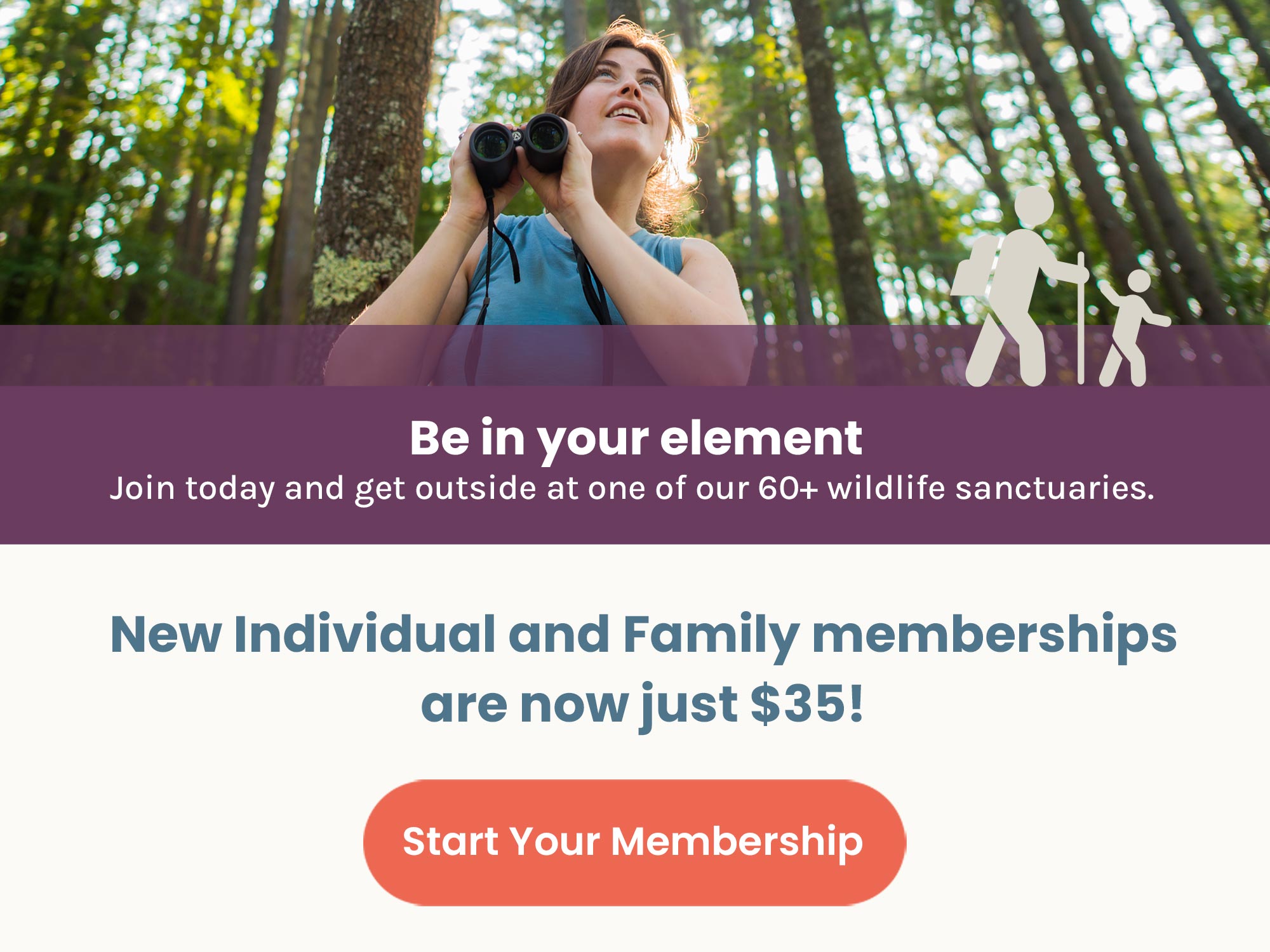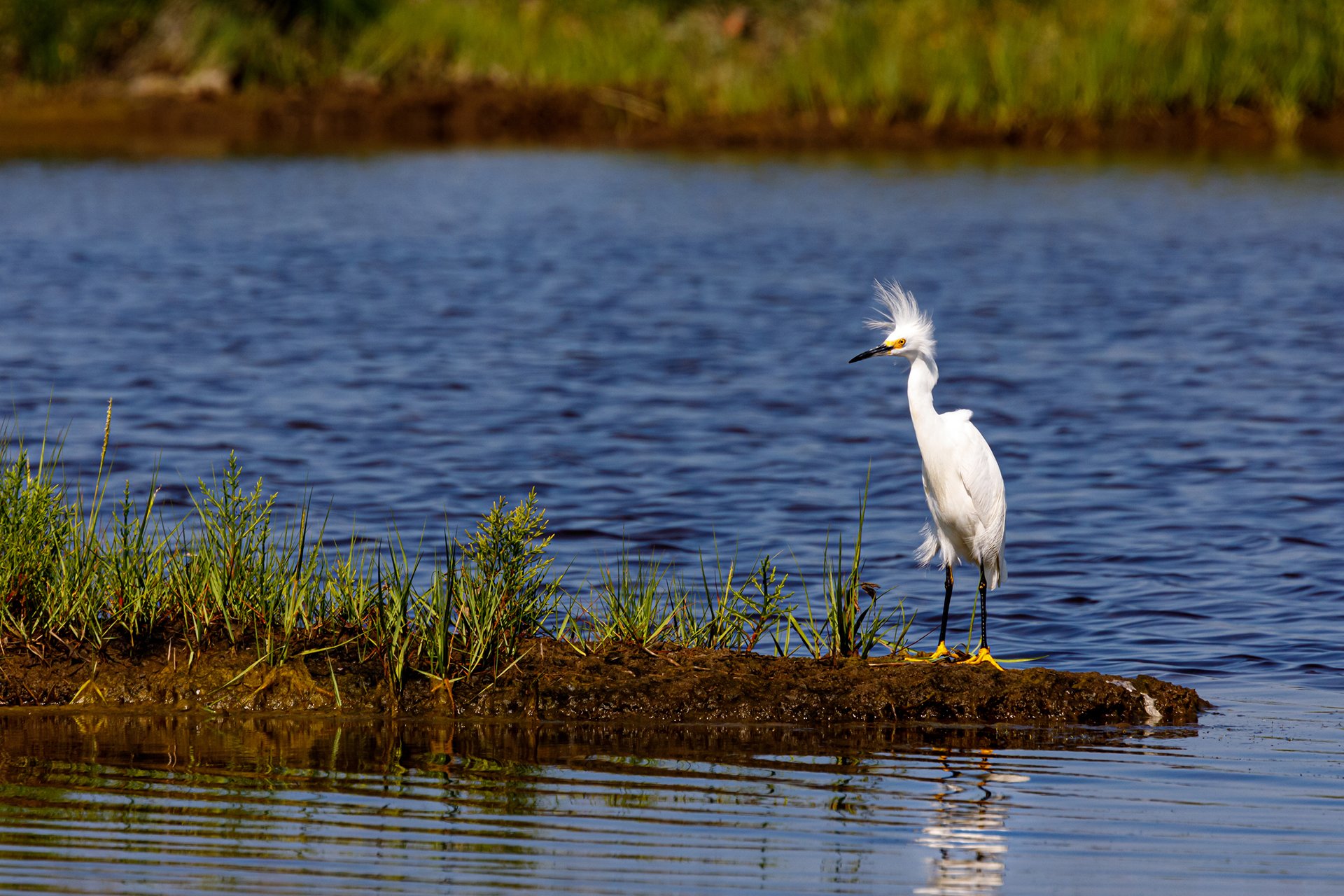Q&A with the Joppa Flats Superbowl of Birding Big Sit Winner
March 10, 2023
We sat down with Kari Sasportas, leader of the award-winning “Big Sit Brant” team at the 2023 Superbowl of Birding, to learn more about their experience at Joppa Flat’s annual birding competition.
What is a “Big Sit”?
A “Big Sit” generally refers to a competitive birding event where people bird from a stationary location for the duration of the event and aim to identify as many birds as possible while staying within a circle of a specified diameter (e.g., 25-50 feet).
As a stationary birding team, we competed for the “Sitting Duck Award” for the highest points earned while birding within a 25-foot diameter circle. The waterfowl on the Merrimack didn’t disappoint us. We had an exciting moment encountering a 5-pointer, picking out a Eurasian Widgeon among a group of American Widgeon through a spotting scope lent to us by Mass Audubon. Our tally at the end of the day was 31 species identified with a total of 40 points.
What makes a “Big Sit” a more accessible option for people?
Because Big Sits are stationary, they may be accessible to birders with disabilities, particularly wheelchair users and people who have access needs related to mobility. My aim was to expand on this traditional Big Sit model and design our team to be as intentionally inclusive of birders with as broad a range of disabilities as possible. I wanted the team to be welcoming and accessible to birders who are Blind or have low vision, are Deaf or hard of hearing, have sensory sensitivities or are Neurodivergent, have PTSD, anxiety or other mental health challenges, have chronic illness, or who have other neurological or cognitive disabilities, including learning disabilities.
In designing a team for more universal access and inclusion, it was important to consider a variety of factors. For example, would the cost of the event or the site location be a prohibitive factor to inclusion? How could we break down a 12-hour event into manageable segments to be more inclusive of people who may have transportation delays, or need to take longer breaks, or need to participate with family members or caregivers for support? Does the site location include accessible restrooms? Are there quiet areas on site away from crowds and/or sheltered from inclement weather? Is equipment available to borrow, including any adaptive equipment? Do the contest rules need to be adjusted for accessibility? Are written, electronic, and/or visual contest promotional materials, participant instructions, and reporting forms accessible for people who use assistive technology (e.g., screen readers, closed captions, etc.)?
In considering these and other questions we needed to make modifications and adjustments for several of these factors to accommodate the team. Also crucial was coming up with a description in sufficient detail for team recruitment so potential participants would know what to expect and the extent to which certain accommodations may or may not be available and make an informed decision about their own ability to participate.
What was the Superbowl of Birding day like?
We were lucky to have a reasonably mild (for January) and sunny day to be birding. The Joppa Flats Education Center was our home base and we birded from the yard behind the building, looking out onto the Merrimack River. We ran two birding shifts, morning and afternoon. Some teammates only stayed for the morning session and others arrived just for the afternoon session.
To ensure continuity and transition between shifts, a core group of 3 of us stayed the whole day. We chose the Joppa Flats site both for habitat (ideal for waterfowl, gulls, soaring raptors, and feeder birds), and for its accessible ground level, including access to bird from both indoors and outdoors if needed, and accessible restrooms. There was a quiet area in the building where teammates who needed a sensory break could take time away from the activity.
One birder on our team, who is blind, brought a microphone to set up next to the outdoor bird feeders so he could listen and identify birds while inside of the building with headphones. Unfortunately, it was a windy day, and the feeder activity was unexpectedly low throughout the day. Our team had two birders, including myself, who are Autistic or Neurodivergent, and other birders who have chronic illness, low vision, and/or identify as having a disability. We were fortunate as well to have family and supportive friends along, either as teammates or allies to cheer us on. One of our teammates livestreamed a portion of our afternoon shift to share on social media with the Feminist Bird Club, a birding organization focused on equity and social justice in the outdoors, so we had a larger group of allies cheering us on remotely.
How did you end up being a Superbowl of Birding team captain, and why did you want to lead an accessible birding team?
I’ve wanted to participate in a competitive birding event for a while now, but I’ve noticed few instances where these events are designed to be inclusive of birders with disabilities. I’m Autistic and LGBTQIA+, and I’ve encountered many situations in my life where I have been stereotyped, stigmatized, invalidated, or harmed while trying to navigate barriers to access and inclusion. Through writing articles and blogs and participating as a panelist and guest speaker on webinars and podcasts, I’ve advocated for increasing inclusion and access to birding and nature for people with disabilities and marginalized intersectional identities. Spending time in nature and birding are known to have many mental health benefits, therefore, it’s vital to public health to ensure that all people can access nature while being able to feel safe and included.
I have long appreciated Mass Audubon’s leadership in accessibility, including the All Persons Trails and accessible nature centers. The supportive, warm, and collegial experience of participating in this year’s cohort of Mass Audubon’s Birder’s Certificate Program (BCP) is helping me increase my confidence as a birder and as a leader. The BCP program involves an Independent Study, and I’d like to focus my independent work on expanding accessible and inclusive opportunities for birders.
Advocacy is a first step to raise awareness, but fundamental structural changes to address access, safety, and inclusion in the outdoors require reinventing the way we do things. By structural changes, I’m not just referring to physical access requirements under the Americans with Disabilities Act (ADA). I’m also referring more broadly to proactive, intentional actions to remove access barriers associated with implicit bias embedded in societal attitudes that reflect generally in policies, designs, activities, and programs.
Dismantling systemic barriers is a complex process. My hope is that successful pilot projects incorporating the leadership and direct lived experience of people with disabilities can be a catalyst for allies to work with us towards broader systems change. This is why I set out to create an accessible birding team from the ground up and lead our team, Big Sit Brant, in Mass Audubon’s 2023 Superbowl of Birding.
How has the birding world made you feel included and welcomed?
I’ve been a birder most of my life in a casual sense, and in the past 12-15 years I’ve been much more dedicated to advancing my skillset. Autistic people tend to have “special interests”, or hobbies in which we maintain a hyperfocus and become completely absorbed. For lack of a better term, birding is my “special interest”, and it has a profoundly positive impact on my wellbeing.
Birding is a pathway for me to connect with other people around a shared interest when conventional means of social interaction, including verbal speech and small talk, are a challenge for me. In addition, birding provides a necessary lifeline for grounding and self-regulation, particularly when the intensity of the sensory and social world, the fast pacing of daily life, and the need to constantly pivot and adapt to changing circumstances and priorities, becomes too overwhelming for me.
When I’m out with other people in the field, being able to focus on the birds, their habitat, and behavior makes me feel much less isolated and eases the constant pressure I feel to mask my autistic traits to prevent rejection. When I’m birding in the context of programs that nurture acceptance, access, and inclusion, I thrive.
What are you looking forward to at next year’s Superbowl of Birding?
We made history as the first team in Mass Audubon’s Superbowl of Birding intentionally designed to be inclusive of birders with disabilities and won the award for the “Sitting Duck” category! We’ve proven that with thoughtful consideration of accessibility and inclusion, birders of all abilities can thrive in nature and enjoy competitive events. There are lessons learned and items we can iterate on to make next year even better. We’re looking forward to even more accessible options and for new birders to join our team.
Stay Connected
Don't miss a beat on all the ways you can get outdoors, celebrate nature, and get involved.



